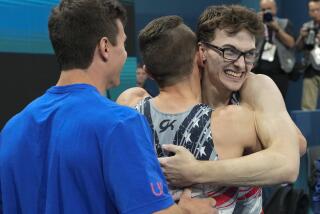Willie Davenport, 59; Olympic Champion
- Share via
Willie Davenport, the 1968 Olympic champion in the men’s 110-meter high hurdles and one of the first African American athletes to represent the United States in the Winter Olympics, has died. He was 59.
Davenport was changing planes at O’Hare International Airport in Chicago on Monday when he collapsed, apparently from a heart attack. He was pronounced dead at Resurrection Medical Center, a hospital spokesman said.
For the record:
12:00 a.m. June 20, 2002 For The Record
Los Angeles Times Thursday June 20, 2002 Home Edition Main News Part A Page 2 National Desk 17 inches; 617 words Type of Material: Correction
Davenport obituary--The obituary of Olympic gold medalist Willie Davenport in Wednesday’s California section incorrectly reported that he lived in Baton Rouge, La. He lived in Falls Church, Va. Identified as a lieutenant colonel in the National Guard, he was actually a colonel in the Army National Guard. Also, he is survived by three children, not one as stated in the obituary. They are Willie Davenport Stewart Jr. of Youngstown, Ohio; Tonya Davenport Morris of Monroe, La.; and Mark Davenport of Baton Rouge. Marian Davenport, identified in the obituary as his wife, is actually his ex-wife.
*
Davenport equaled the then-Olympic record of 13.33 seconds in winning the high hurdles in the 1968 Games in Mexico City. In the same event, he placed fourth at Munich in the 1972 Games and third at Montreal in 1976, when he was 33. He was a surprise winner of the 1964 Olympic trials in the high hurdles, but was eliminated in a semifinal heat of the Games in Tokyo while battling a leg injury.
Davenport, who later served on the U.S. Olympic Committee, was frustrated by his first Olympic experience, but he beat U.S. teammate Erv Hall for the gold medal in 1968.
Although he was so nervous before the start of the race that he almost fell while taking off his sweat pants, he said he knew he was going to win when the starter’s pistol was fired.
“I knew I had won the race,” he said. “It was perhaps the only race I ever ran that way, but that first step was so perfect, right on the money. I coasted over the last three hurdles thinking, ‘It’s over, it’s over.’ ”
John Smith, a renowned sprint coach and a teammate of Davenport’s on the 1972 Olympic team, said that 1960 Olympic long jump champion Ralph Boston gave Davenport the nickname “Breeze” because of the grace with which he cleared the 42-inch-high hurdles.
“He would just flow over them like the wind,” Smith said. “He was just that efficient as a hurdler.”
Smith, the top-ranked 400-meter runner in the world while at UCLA in 1971, met Davenport in 1968 shortly after graduating from Fremont High in Los Angeles. The two became friends a couple of years later and roomed together several times while representing the United States in international meets.
“He always had a smile on his face,” said Smith, who coaches Olympic 100 champion Maurice Greene, among others, for the highly regarded HSI club based in Irvine. “He had a country air about him. He never got too caught up in his accomplishments.”
Davenport, who was born in Troy, Ala., and attended Southern University in Baton Rouge, La., gained prominence in 1976 when he won a bronze medal in the high hurdles at 33, when most sprint and hurdle athletes have long since retired.
But his greatest athletic acclaim, at least in the eyes of the national media, might have come in 1980, when he and Jeff Gadley became the first African American athletes to represent the United States in the Winter Olympics in Lake Placid, N.Y.
Davenport and Gadley, who also had a track and field background in the decathlon, were members of the U.S. four-man bobsled team that finished 12th. Along with Bob Wilson, a Canadian bobsledder, they were the first blacks to compete in the Winter Olympics.
“I am very proud,” Davenport said during the Games in Lake Placid. “Words can’t explain how I feel. Webster doesn’t have a word for it. ‘Good’ doesn’t do it. Neither does ‘great.’
“There was a myth that blacks couldn’t make the Winter Olympics. That inspired me. I think it’s important that black Americans get involved in everything our country has to offer. Go to any black neighborhood and you see homemade basketball courts and homemade baseball diamonds. If black kids grow up skating, they will be in the winter Olympics. It just needs exposure.”
Later, Davenport said he loved the actual bobsled competition but didn’t like the cold and snow.
“I just wasn’t used to competing in conditions like that,” he said. “But I highly recommend bobsledding for fun.”
The medical center spokesman said Davenport was a lieutenant colonel in the National Guard. He apparently was on National Guard business in Boise, Idaho, and, according to his wife, Marian, was traveling to his office in Falls Church, Va., when he collapsed.
Davenport was inducted into the USA Track and Field Hall of Fame in 1982 and into the Olympic Hall of Fame in 1990. After retiring from track, he entered the National Guard.
Davenport, who lived in Baton Rouge, is survived by his wife and their son, Mark.
Military funeral arrangements are pending.
More to Read
Go beyond the scoreboard
Get the latest on L.A.'s teams in the daily Sports Report newsletter.
You may occasionally receive promotional content from the Los Angeles Times.






